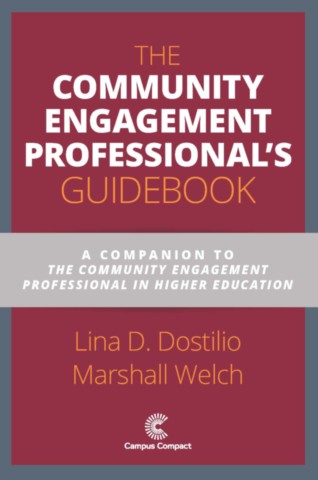20% off of book prices
for Campus Compact member campuses.

Library E-Books
We are signed up with aggregators who resell networkable e-book editions of our titles to academic libraries. These editions, priced at par with simultaneous hardcover editions of our titles, are not available direct from Stylus.
These aggregators offer a variety of plans to libraries, such as simultaneous access by multiple library patrons, and access to portions of titles at a fraction of list price under what is commonly referred to as a "patron-driven demand" model.
E-books are now distributed via RedShelf or VitalSource
You will choose the vendor in the cart as part of the check out process. These vendors offer a more seamless way to access the ebook, and add some great new features including text-to-voice. You own your ebook for life, it is simply hosted on the vendors website, working much like Kindle and Nook. Click here to see more detailed information on this process.
250 pp., 6" x 9"
Language: English
This book is a companion guide to Campus Compact’s successful publication The Community Engagement Professional in Higher Education. In the first text, Campus Compact Research Fellows - led by award-winning scholar-practitioner Lina D. Dostilio - identified a core of set of competencies needed by professionals charged with leading community engaged work on college campuses. In this companion guide, Dostilio teams up with Marshall Welch to build on the initial framework by offering guidance for how a community engagement professional (CEP) should conceptualize, understand, and develop their practice in each of the original competency areas.
Over 10 chapters the authors address questions for those “brand new to the role” and interested in how to start a community engagement unit or center, or from people who are considering jobs doing the work on a campus, or from individuals “are trying to navigate the political environment on their campuses to expand and deepen their unit’s reach.”
The Guidebook offers a rich and deep dive, breaking down the essential components of a professional’s work. From mentoring faculty research, leading campaigns to build civic engagement curriculum on campus, to managing the staff who support community engagement units, Dostilio and Welch tackle the breadth of the CEP’s work by drawing on key resources and their own decades of experience in the field. Throughout the book, readers will encounter “Compass Points” that call for personal reflection and engagement with the text. These interactive moments combine with end-of-chapter questions to prompt thinking about a CEP’s critical commitments, to create a powerful and engaging toolkit that will be essential for any person doing community and civic engagement work on campus.
1) The Pathway
2) Adopting and Promoting the Public Purposes of Higher Education
3) Leading Change in Higher Education
4) Institutionalizing Community Engagement on Campus
5) Knowing Community Engagement Administration
6) Doing Community Engagement Administration
7) Facilitating Students’ Civic Learning and Development
8) Providing Faculty Development
9) Cultivating High-Quality Partnerships
10) Implementing Anchor Institution Strategies
References
Index
“The Community Engagement Professional in Higher Education: A Competency Model for an Emerging Field is a discussion of a systematic collection of 103 competencies, in areas of knowledge, skills, abilities, and dispositions, for community engagement professionals and the process undertaken to develop the set.
The Community Engagement Professional’s Guidebook is a compilation of advice, questions, and reflections to assist the reader in deep engagement and application of the competencies. I would suggest reading the two texts in sequence. Though the Guidebook stands alone, the primary text gives readers context and an explanation of the research methodology used to develop and select the competencies
A Competency Model is an academic introduction to the model and is an edited volume, with different authors explaining their academic contributions to subsets of competencies. \It reads like a formal panel presentation at an academic conference, with each chapter representing a research team’s contributions to the whole. An authored text, the feels more like a coaching session with a mentor—a singular voice in an informal tone encouraging reflection.
Without question, Dostilio and her coauthors have made a monumental contribution to the field of community engagement with the Community Engaged Professional [CEP] competency model. Surely this model will ignite more research on the profession of CEPs, provide a framework for professional development, and enhance community–campus partnerships. These texts should be required reading for all CEPs.”
- Journal of Higher Education Outreach and Engagement

